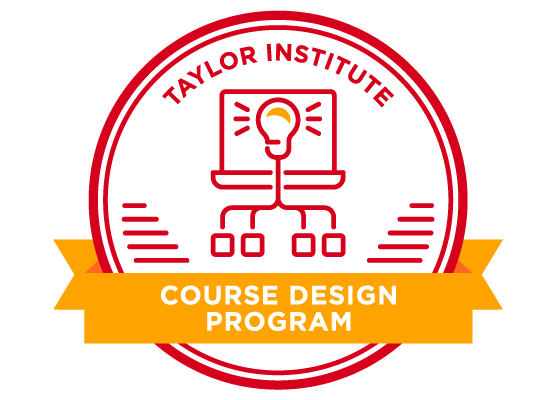Program overview
The Course Design Program uses evidence-based practical strategies to help inform and direct your course design. The program includes student-centred learning topics to help you through complete course designs or re-designs, developing your course outline, planning assessments, and promoting student engagement. The flexible format uses both asynchronous and synchronous approaches for participants to engage with the material, each other and the facilitators. This program will help you to develop an overall course design plan and identify practical strategies for designing, teaching, and evaluating your course, whether your course is online, in the classroom, or blended.
Program details
You will have opportunities to engage in the following:
- Conduct a front-end analysis in order to identify important elements in your course design
- Write effective course learning outcomes for your course Select and sequence course content
- Identify practical constraints for your course and select strategies to mitigate them
- Choose student assessment strategies that are an accurate measure of the course learning outcomes
- Select teaching and learning activities in alignment with course learning outcomes and assessment strategies
- Evaluate your course design
By completing the required elements, participants can qualify for the Course Design Program badge. Requirements include:
- Attending the Foundations of Course Design
- Select three of the four following supplementary sessions*:
- Writing course learning outcomes
- Incorporating student assessment strategies into your course design
- Effective feedback strategies for instructors
- Best practices for designing a quality rubric for instructors
- Completing the following assignments:
- Participate in D2L Discussion Board Activities (Weekly Workshop Takeaway Reflections)
- Provide peer feedback on the draft course design plan
- Submit final course design plan, including reflective comments on peer feedback.
Once you have registered for the program, you will automatically be registered for all four supplementary workshops.
The program will now take place over a 6-week period (with weekly workshops) rather than over the course of the semester.
Required workshops and topics
This workshop provides participants with foundations of course design, including writing course learning outcomes, planning student assessments, and selecting appropriate activities. Good course design practices can be applied to many types of courses including online, classroom, blended, labs and more. We will provide a theoretical overview of course design, practical examples and activities for participants to work through in their own courses while keeping student engagement in mind.
- Facilitator: Lorelei Anselmo, MEd
- Method of delivery: Online synchronous
- Date: Thursday, September 11 from 10 -11 a.m.
By the end of this workshop, you will be able to:
- Communicate the overall purpose and intended student learning experience of your course
- Select a course design approach using pedagogical models/frameworks - apply principles of constructive alignment to intentionally align elements of your course
- Evaluate your course design before the course is taught
Learning outcomes state what students should know or be able to accomplish at the end of the learning activity. This workshop will explore the essentials and purposes of learning outcomes.
- Facilitator: Lorelei Anselmo, MEd
- Method of delivery: Online synchronous
- Date: Thursday, September 18 from 10 -11 a.m.
By the end of the workshop, participants will be able to:
- Identify the purposes of learning outcomes
- Identify the significant elements of learning outcomes
- Produce effective learning outcomes
Strategically selecting and aligning student assessments to course learning outcomes is one strategy to ensure meaningful assessment and learning. Whether in the classroom or online, traditional and alternative assessment strategies can be integrated into the course design to ensure rigorous and effective student assessment. Drawing on course design best practices, this workshop provides an opportunity to work through a variety of online assessment strategies.
- Facilitator: Lorelei Anselmo, MEd
- Method of delivery: Online synchronous
- Date: Thursday, September 25 from 10 -11 a.m.
By the end of the workshop, participants will be able to:
- Discuss a variety of alternative assessment strategies for either F2F, blended or online environments
- Select appropriate assessment methods that are connected to course learning outcomes
Feedback is a powerful tool to evaluate students’ learning and improve student achievement. There are a variety of ways to provide feedback that can build student confidence and motivation. In this workshop, participants will explore effective feedback strategies that contribute to a positive learning experience for students.
- Facilitator: Lorelei Anselmo, MEd
- Method of delivery: Online synchronous
- Date: Thursday, October 2 from 10 -11 a.m.
By the end of this workshop, students will be able to:
- Identify different components of meaningful feedback
- Discover multiple formats to deliver feedback
- Recognize techniques for communicating positive feedback
A rubric is more than a grading tool. In online and blended courses, rubrics are a great way to gauge student learning, engagement, and competencies. Designing high-quality rubrics for use in online and blended learning courses promote student-centered learning through clear communication, explicit assignment expectations, and timely feedback. In this workshop, we will use sample rubrics to explore best practices and learn how to use the Rubrics tool in D2L for efficient teaching and learning.
- Facilitator: Lorelei Anselmo, MEd
- Method of delivery: Online synchronous
- Date: Thursday, October 16 from 10 -11 a.m.
By the end of this workshop, you will be able to:
- Identify essential markers of competency and integrate them into a D2L rubric
- Leverage rubrics to identify opportunities for deeper learning or skills development
- Embed opportunities for formative feedback and development throughout your course
Instructors
Lin Yu
Learning & Instructional Design Specialist
Lorelei Anselmo
Teaching Supports Team Lead


